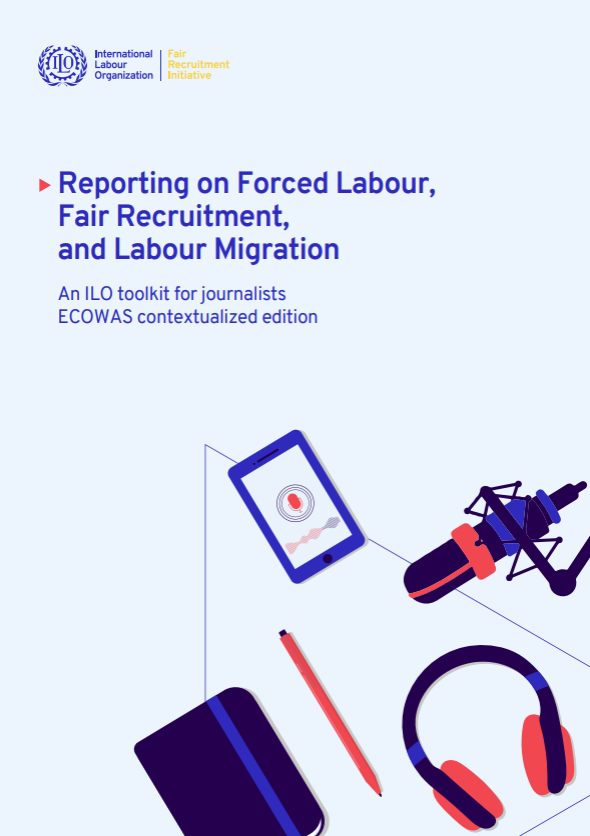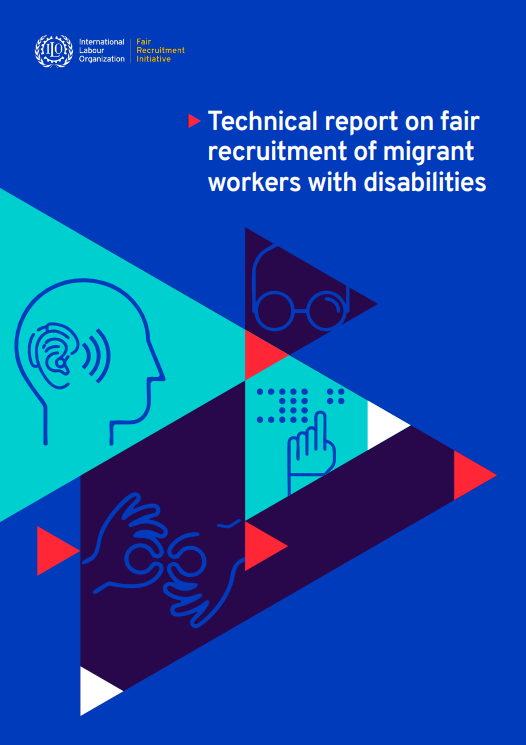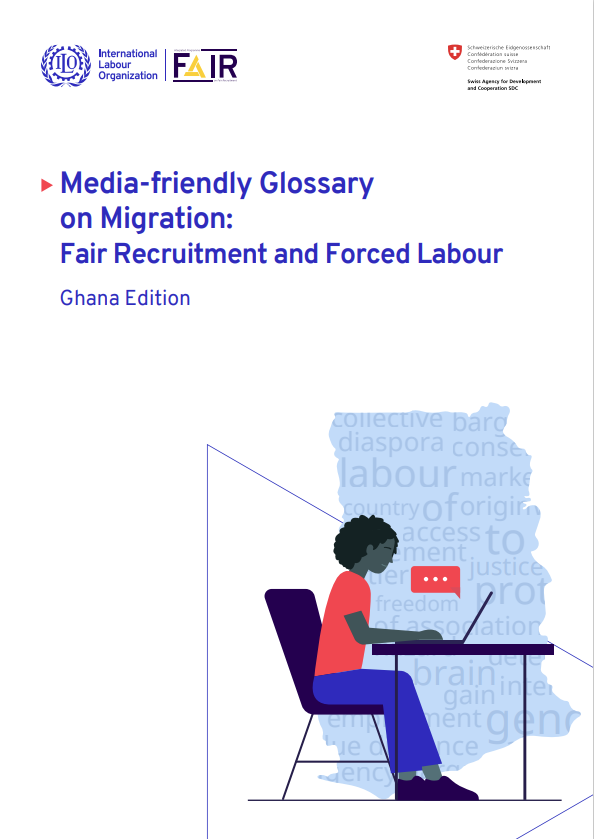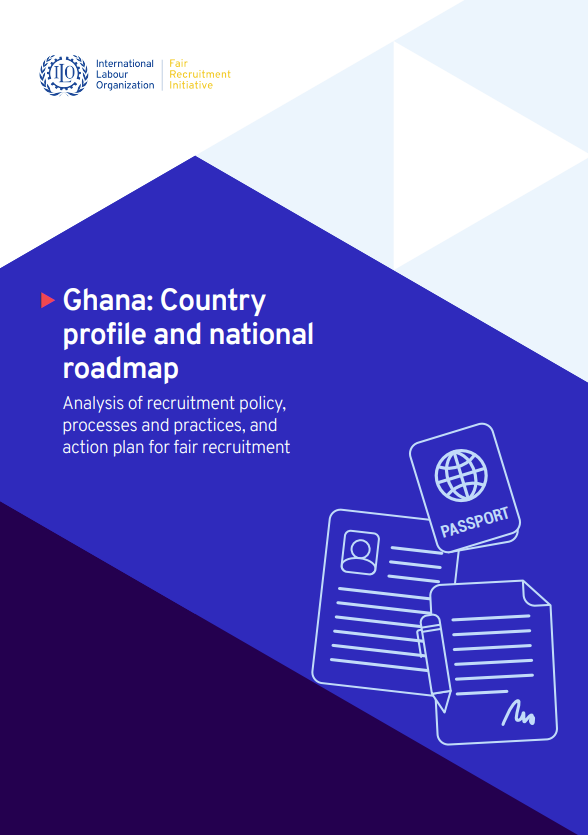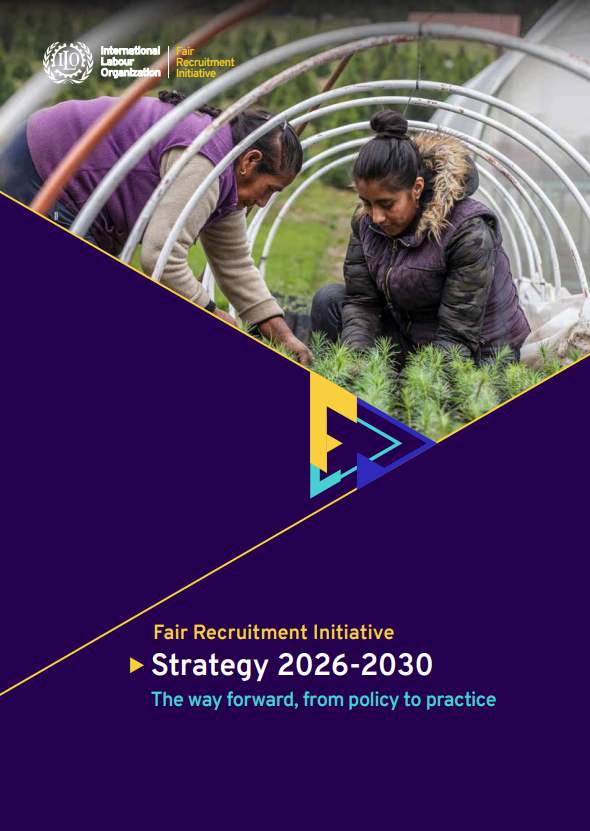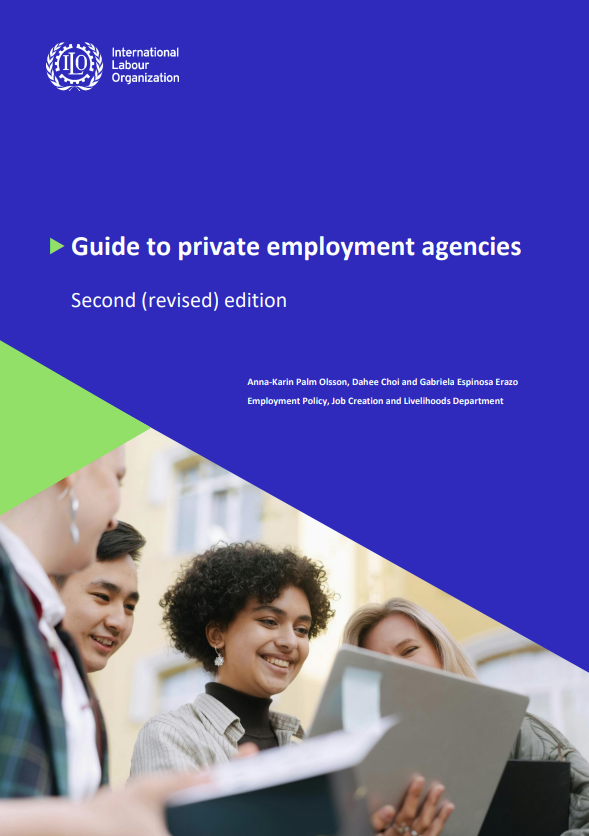Egypt supports employment agencies to promote fair recruitment abroad
Posted at January 9th 2026 12:00 AM | Updated as of January 9th 2026 12:00 AM
Region/Country :
|Themes : , ,
Reporting on Forced Labour, Fair Recruitment, and Labour Migration. An ILO toolkit for journalists. ECOWAS contextualized edition.
This toolkit provides practical guidance for journalists reporting on forced labour, fair recruitment, and labour migration in the ECOWAS region. It aims to support more accurate, balanced, and evidence-based media coverage, helping to counter misinformation, challenge harmful narratives, and highlight the socio-economic contributions of migrant workers.
Developed by the International Labour Organization (ILO), it was produced with contributions from media professionals, international organizations, and regional experts, and draws on lessons learned from previous media engagement initiatives. It provides both conceptual explanations and practical tools, including reporting guidelines, ethical considerations, and real-world examples to support journalists in navigating complex migration-related topics.
The publication was developed within the framework of the Integrated Programme on Fair Recruitment (FAIR III), the Support to Free Movement of Persons and Migration in West Africa (FMM West Africa II), and the Action for Improving Labour Migration Governance in Nigeria (ACTION). It reflects field-based experience and regional priorities, ensuring its relevance for stakeholders across West Africa. It ultimately contributes to strengthening informed public discourse, improving migration governance, and advancing decent work for migrant workers.
Type of document :
Country/Region :
Year of publication :
Theme : , , ,
Technical report on fair recruitment of migrant workers with disabilities
The International Labour Organization (ILO) is committed to advancing fair recruitment practices that respect human rights and promote decent work for all. Since its launch in 2014, the ILO Fair Recruitment Initiative (FRI) has sought to ensure that recruitment processes are con-ducted in a fair, transparent, and inclusive manner, guided by international labour standards and rooted in the principles of equality and non-discrimination.
This technical report on fair recruitment of persons with disabilities, with a specific focus on migrant workers, represents an important step toward filling a critical knowledge gap at the intersection of disability inclusion, migration, and recruitment. While the ILO’s General Principles and Operational Guidelines for Fair Recruitment underscore the importance of non-discrimination, explicit guidance on the inclusion of persons with disabilities, particularly mi¬grant workers, remains limited.
By examining existing literature, identifying key challenges and good practices, and situating these within the framework of relevant ILO standards, this brief seeks to lay the groundwork for more inclusive recruitment policies and practices.
References
- DOI: https://doi.org/10.54394/BUNS0985
Type of document :
Country/Region :
Year of publication :
Theme : , ,
Ghana Advances Fair Recruitment Agenda with the Validation of two Key Reports
Posted at December 11th 2025 12:00 AM | Updated as of December 11th 2025 12:00 AM
Region/Country :
|Themes : , ,
Media-friendly glossary on migration: Fair recruitment and forced labour - Ghana edition
Supported by the Integrated Programme on Fair Recruitment – Phase III (FAIR III), the ILO Media-Friendly Glossary on Migration has been specifically adapted for the Ghanaian context to serve as a guideline for journalists, researchers, trainers, and other actors in Ghana who write about labour migration, especially in the context of recruitment and forced labour.
It is important to define common ground and avoid confusion and misunderstanding that can arise in using migration-related terminology. This version of the glossary aims to promote rights-based terminology to encourage rigorous and balanced media coverage and ensure that the narratives produced reflect the multiple dimensions of labour migration. It contains both general terminology relating to labour migration and specific terminology relevant when describing labour migration in Ghana.
Type of document :
Country/Region :
Year of publication :
Theme : ,
Reporting on forced labour and fair recruitment: An ILO toolkit for journalists in Ghana
In 2020, the ILO launched a Global Media Toolkit on Reporting on Forced Labour and Fair Recruitment to strengthen media engagement on issues of labour migration. The toolkit is a useful resource for journalists, providing a guide for media professionals on how to report accurately and effectively on forced labour and fair recruitment issues.
Supported by the Integrated Programme on Fair Recruitment – Phase III (FAIR III), the Global Media Toolkit has been contextualized and adapted for use in Ghana. It is designed to help journalists and other media practitioners in Ghana to effectively report on labour migration and promote fair recruitment practices.
Type of document :
Country/Region :
Year of publication :
Theme : ,
Ghana: Country profile and national roadmap: Analysis of recruitment policy, processes and practices, an action plan for fair recruitment
This Recruitment Country Profile is a study on the legal and regulatory framework governing the recruitment and placement of migrant workers in Ghana that provides a comprehensive analysis of the existing national system, identifies gaps, and offers concrete recommendations to strengthen governance of recruitment based on workers’ rights.
Supported by the Integrated Programme on Fair Recruitment – Phase III (FAIR III), it represents an analytical and participatory effort to strengthen the governance of recruitment of migrant workers in Ghana. Grounded in the ILO’s General Principles and Operational Guidelines for Fair Recruitment and relevant international labour standards, it identifies key normative and institutional gaps in the current framework and proposes measures to align national legislation and policies with international standards. Through documentary analysis and tripartite stakeholder consultations, the study serves as a practical and strategic tool for guiding public policy, strengthening coordination among actors, and advancing fair recruitment.
The second part of the document is showcasing a National Roadmap to promote fair recruitment in Ghana, an effort to enhance labour migration governance and ensure the protection of migrant workers’ rights. Developed through a consultative process involving key stakeholders, the roadmap provides a strategic framework for fostering fair and transparent recruitment practices in Ghana.
It aims to align Ghana's national policies and practices with international labour standards and human rights relevant to fair recruitment, ensuring that migrant workers, whether in Ghana or abroad, are protected from exploitation, abuse, and discrimination and can enjoy decent and productive employment. In addition to more robust regulatory oversight, it supports the integration of fair business practices among employers, ensures a strong role for workers’ organizations, and engages media professionals to raise public awareness on labour migration and recruitment issues.
Type of document :
Country/Region :
Year of publication :
Theme : , ,
Awareness Workshops on Migrant Workers’ Rights Launched in Somalia
Posted at December 4th 2025 12:00 AM | Updated as of December 4th 2025 12:00 AM
Region/Country :
|Themes : , ,
Fair Recruitment Initiative Strategy 2026-2030: The way forward, from policy to practice
The Fair Recruitment Initiative (FRI) was launched by the ILO in 2014 to ensure fair recruitment of workers at the national and international level, bringing renewed visibility to this important issue. Over the years, the FRI has become a central pillar of the ILO’s Fair Migration Agenda and has strengthened collaboration among governments, employers, and workers to ensure transparent recruitment practices that protect workers' rights and uphold international labour standards through social dialogue and fair treatment.
The Fair Recruitment Initiative Strategy 2026–2030 sets a clear path forward: moving from principles and guidance to practical implementation and enforcement, to make fair recruitment a reality for all workers, across all sectors and countries, within and across borders. The new strategy was conceived as an inclusive process, reflecting evidence and data collected across countries, key migration corridors and high-risk sectors to ensure targeted interventions that tackle emerging challenges.
This work builds on a decade of experiences, achievements, and lessons learned. This new strategy has also benefited from the rich exchanges and inputs generated during the Global Conference “Fair Recruitment Initiative: The way forward, from policy to practice”, held in May. This conference, that brought together government officials, employers' and workers' representatives, recruitment agencies, international organizations, and researchers provided valuable guidance for moving from policy commitments to practical implementation. This tripartite high-level discussion served as a platform to review progress, explore practical solutions, and strengthen collaboration with stakeholders. The event marked the launch of this new strategy, reaffirming a common commitment to advancing fair recruitment through collective action.
Content available in English, español and français.
Type of document :
Country/Region :
Year of publication :
Theme : , ,
Guide to private employment agencies - second (revised) edition
Private employment agencies are increasingly shaping the world of work - connecting job seekers to opportunities, helping employers meet skills needs, and supporting more dynamic labour markets. Yet with this growing influence comes responsibility: promoting fair recruitment, protecting workers’ rights, and maintaining trust in labour market systems.
Why This Guide Matters
This revised Guide provides governments, employers, workers, and practitioners with a comprehensive framework for fair, transparent, and effective employment services. It highlights the vital role PrEAs play in improving labour market functionality while focusing on two key pillars: labour market alignment and fair recruitment practices.
Responding to Today’s Labour Market
Rapid changes - from digitalization and demographic shifts to migration and the green transition - demand flexible, robust regulatory systems. This Guide shows how PrEAs can adapt by strengthening oversight, leveraging digital tools, and aligning with international labour standards.
Partnership is Key
Drawing on ILO Conventions No. 181 and No. 88, the Guide emphasizes collaboration between public and private employment services. Strategic partnerships improve job matching, strengthen active labour market policies, and expand access to opportunities for those in vulnerable situations. Practical examples, from common terminology and shared digital platforms to joint monitoring systems, show how cooperation enhances efficiency and fairness.
Fair Recruitment: A Shared Responsibility
Fair and transparent recruitment is essential for all workers, especially for migrant workers. Embedding these principles across employment services strengthens trust and advances decent work globally.
A Call to Action
This Guide is more than a reference - it’s an invitation to act. Governments can create responsive frameworks, employers and PrEAs can uphold high professional standards, and workers’ organizations can ensure voices are heard. Together, we can make labour markets more inclusive, transparent, and fair.
This content is avalailbe in English and Español.
Type of document :
Country/Region :
Year of publication :
Theme : ,
Subscribe to the Fair Recruitment Initiative Newsletter
Sign up to receive news delivered to your inbox.

